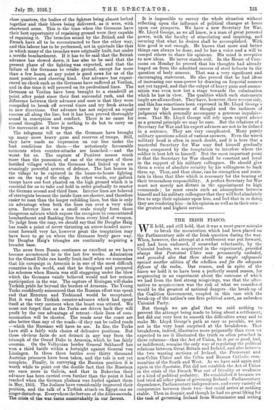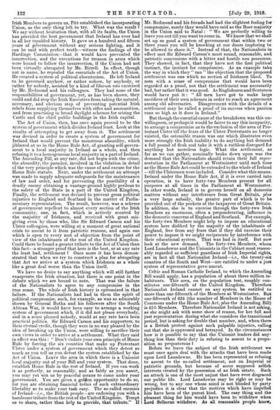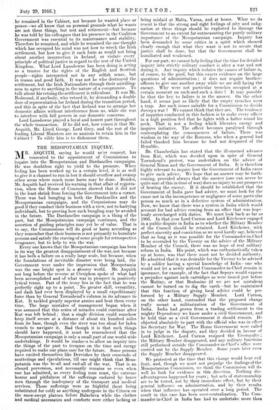THE IRISH FIASCO.
WE held, and still hold, that it was a most grave mistake to break the moratorium which had been placed on the Parliamentary side of the Irish question during the war. When, however, the attempt at a settlement was put forward, and had been endorsed, if somewhat reluctantly, by the Unionist leaders, we acquiesced in the experiment, provided always that Protestant Ulster was permanently excluded, and provided also that there should be ample safeguards against another edition of the rebellion and for the adequate defence of the realm. Our reason, and in spite of the fiasco we hold it to have been a perfectly sound reason, for acquiescing in an experiment about the outcome - of which we had from the first strong misgivings, was that the alter- native to acquiescence was the risk of what we considered would be the greatest of national dangers—the break-up of the Coalition Government, coupled in this case with the break-up of the nation's one firm political asset, an unbroken Unionist Party.
But though we are glad that we said nothing to prevent the attempt being made to bring about a settlement, but did our very best to smooth the difficulties away and to make Mr. Lloyd George's path as easy as possible, we are not in the very least surprised at the breakdown. That breakdown, indeed, illustrates more poignantly than even we expected to see it illustrated the truth so often preached in these columns—that the Act of Union, be it per se good, bad, or indifferent, remains the only way of regulating the political relations between Great Britain and Ireland, and also between the two warring sections of Ireland, the Protestant and non-Celtic Ulster and the Celtic and Roman Catholic com- munities of the South and West. As we have said again and again in the Spectator, Pitt did not establish the Act of Union in the crisis of the French War out of frivolity or weakness or a kind of political pedantry. He established it because we had tried all other plans of governing Ireland—Parliamentary dependence, Parliamentary independence, and every variety of compromise between these two—but could arrive at nothing stable. Then in despair, and though he had no great liking for the -taalc.of governing. Ireland from. Westminster and setting Irish Members to govern us, Pitt established the incorporating Union, as the only thing left, to try. What was the result We say without hesitation that, with all its faults, the Union has provided the best government that Ireland has ever had in all her troubled history. It gave us a hundred and fifteen years of gOvernment without any serious fighting, and it can be said with perfect truth—witness the findings of the Hardinge Commission—that it would have prevented the insurrection, and the executions for treason in arms which were bound to follow the insurrection, if the Union had not been virtually abrogated by Mr. Birrell. In effect, though not in name, he repealed the essentials of the Act of Union. He created a system of political absenteeism. He left Ireland to be governed anyhow, or rather nohow, by anybody, or rather by nobody, assisted by a kind of liberum veto exercised by Mr. Redmond and his colleagues. They had none of the responsibilities of government, yet, as has been shown, they could and did stop the Irish Executive from taking the natural, necessary, and obvious step of preventing potential Irish rebels from supplying themselves with rifles and ammunition, and from practising in broad daylight schemes for seizing the Castle and the chief public buildings in the Irish capital.
The Act of Union, then, has once again proved to be the system of government which divides Ireland least. Look at the results of attempting to get away from it. The settlement was devised in order to create a system of government for Ireland that would prevent the monstrous absurdity, which jibbered at us in the Home Rule Act, of granting self-govern- ment to a local majority in Ireland as a whole, and then refusing it to a homogeneous local majority in a part of Ireland. The Amending Bill, at any rate, did not begin with the crime, the absurdity, the paradox, involved in the violation in detail of the very principle which was the cause of and excuse for the Home Rule statute. Next, under the settlement an attempt was made to supply adequate safeguards for the maintenance of law and order, and for preventing the possibility of a deadly enemy obtaining a vantage-ground highly perilous to the safety of the State in a part of the United Kingdom. Finally, the settlement was devised to prevent gross political injustice to England and Scotland in the matter of Parlia- mentary representation. The result, however, was a scheme of government repellent to almost every section of the Irish community, one, in fact, which is actively scouted by the majority of Irishmen, and received with great mis- giving even by those who, like Sir Edward Carson and his Ulster colleagues, were willing at a moment of great national crisis to assent to it from patriotic reasons, and again one which is open to every sort of objection from the point of view of the inhabitants of the rest of the United Kingdom. Could there be found a greater tribute to the Act of Union than this fact—a stronger proof that here is the best, or at any rate the least bad, settlement / Once more it has been demon- strated that when we try to construct a plan for abrogating that Act we arrive at a system which Irishmen as a whole like a great deal worse than the Union itself.
We have no desire to say anything which will still further exasperate the Irish situation, but there is one point in the debate which we are bound to note. That was the failure of the Nationalists to agree to any compromise in the true sense. The whole of Irish history is epitomized in that failure. If the Nationalists had had in them the spirit of political compromise, such, for example, as was so admirably shown by General Botha and his followers after the South African War, it would have been easy to arrange a working system of government which, if it did not please everybody, and in a sense pleased nobody, would at any rate have been practical politics. Sir Edward Carson and his supporters, to their eternal credit, though they were in no way pleased by the idea of breaking up the T3nion, were willing to sacrifice their own views in order to arrive at a settlement. What they said in effect was this : " Don't violate your own principle of Home Rule by forcing the six counties that make up Protestant Ulster under a system of government which they detest as much as you tell us you detest the system established by the Act of Union. Leave the area in which there is a Unionist local majority out of your Bill and your system. That done, establish Home Rule in the rest of Ireland. If you can work it as perfectly, as reasonably, and as fairly as you assert, you may yet win us by peaceful means to come under your government. You are given a golden opportunity to do so, for you are obtaining' financial terms of such extraordinary liberality as to make your task easy. The so-called enemies of Ireland—i.e., the British people—are endowing you with a handsome tribute from the rest of the United Kingdom. Tempt us to share, rather than help to provide, that tribute." If Mr. Redmond and his friends had had the slightest feeling for • compromise, surely they would have said as the Boer majority in the Union said to Natal : " We are perfectly willing to leave you out till you want to come in. We know that we shall set up so good a system of government that within two or three years you will be knocking at our doors imploring to be allowed to share it." Instead of that, the Nationalists in effect met Sir Edward Carson's most sound, reasonable, and patriotic concessions with a bitter and hostile non possumus. They showed, in fact, that they have not the first political instinct, the instinct for compromise. As an example take the way in which they " ran " the objection that the proposed settlement was one which no section of Irishmen liked. To men with a sense of compromise that would have been regarded as a proof, not that the settlement was necessarily bad, but rather that it was good. As Englishmen and Scotsmen would have put it : " All men have got to make large sacrifices of their own schemes in order to reach an agreement among old adversaries. Disagreement with the details of a settlement may be called a proof of its success when passion runs so high as it does in Ireland."
But though the essential cause of the breakdown was this un- willingness, or perhaps it would be fairer to say this incapacity, to arrange a compromise as to the exclusion of the area of Pro- testant Ulster till the fears of the Ulster Protestants no longer existed, the ostensible reason was one which illustrates even more strongly the Irish inability to do anything but demand a full pound of flesh and take it with a ruthless disregard for anything but merciless logic. What the settlement, as far as we can gather, nominally broke down upon was the demand that the Nationalists should retain their full repre- sentation in the Parliament at Westminster until such time as the Home Rule Act could be extended to the whole of Ireland —till the Ulstermen were included. Consider what this means. Ireland under the Home Rule Act, if it is ever carried into operation, is to have forty-two Members present for all purposes at all times in the Parliament at Westminster. In other words, Ireland is to govern herself on all domestio matters without any interference from Great Britain, plus a very large subsidy, the greater part of which is to be provided out of the pockets of the taxpayers of Great Britain. In addition, she is to exercise through the forty-two Irish Members an enormous, often a preponderating, influence in the domestic concerns of England and Scotland. For example, the forty-two Members might help to impose an educational system here disliked by the majority of the inhabitants of England, free from any fears that if they did exercise their power to impose it we might reciprocate by interference with their educational system. That was bad in itself. But now look at the new demand. The forty-two Members, whom Lord Lansdowne and the Unionists in the Cabinet most reason- ably regarded as sufficient guardians of Irish Imperial rights, are in fact all that Nationalist Ireland—i.e., the twenty-six counties of the South and West—are entitled to under a just system of representative gove:nment.
Celtic and Roman Catholic Ireland, to which the Amending Bill would apply, has a population of about three million in- habitants. This area, on the population test, roughly con- stitutes one-fifteenth of the United Kingdom. Therefore Nationalist Ireland cannot on any system be entitled to more than one-fifteenth of the Members at Westminster. But one-fifteenth of 634 (the number of Members in the House of Commons under the Home Rule Act, plus the Amending Bill) is 42,4, Members. Therefore Nationalist Ireland is not asking, as she might ask with some show of reason, for her full and just representation during what she considers the transitional period, lint is asking for double that number, and, when.there is a British protest against such palpable injustice, calling out that she is oppressed and betrayed. In the circumstances how is it possible to say that the Unionist leaders did any- thing less than their duty in refusing to assent to a propo- sition so preposterous Before we leave the subject of the Irish settlement we must once again deal with the attacks that have been made upon Lord Lansdowne. He has been represented as refusing to assent to the so-called settlement, not on Imperial or patriotic grounds, but because of some supposed selfish interests created by the possession of an Irish estate. Such an attack is one of the most unjust that have ever disgraced our public life. Lord Lansdowne may be right or may be wrong, but to any one whose mind is not blinded by party prejudice it is clear that the motives which have impelled him have been of the purest kind. The easy. thing and the pleasant thing for him would have been to withdraw when Lord Selborne withdrew. As all reasonable people know, he remained in the Cabinet, not because he wanted place or power—we all know that on personal grounds what he wants are not these things, but rest and retirement—but because he was told by his colleagues that his presence in the Coalition Government was essential to its maintenance and stability. Therefore he remained, and while he remained the one thought which has occupied his mind was not how to wreck the Irish settlement, but how to give it such form as would not bring about another insurrection in Ireland, or violate every principle of political justice in regard to the rest of the United Kingdom. What Lord Lansdowne has been doing is acting as a trustee for the rights of the English and Scottish people—rights interpreted not in any selfish sense, but in reason and good faith. It was not he who destroyed the settlement, but the Irish Nationalists through their unwilling- ness to agree to anything in the nature of a compromise. To talk about his vetoing the settlement is ridiculous. It was Mr. Redmond, if anybody, who vetoed it, by demanding a double dose of representation for Ireland during the transition period, and this in spite of the fact that Ireland was to arrange her domestic affairs without interference from us, while she was to interfere with full powers in our domestic concerns. Lord Lansdowne played a loyal and honest part throughout the whole transaction. If he did not, how comes it that Mr. Asquith, Mr. Lloyd George, Lord Grey, and the rest of the leading Liberal Ministers are so anxious to retain him in the Cabinet ? To vilify him is to dishonour them.
































 Previous page
Previous page